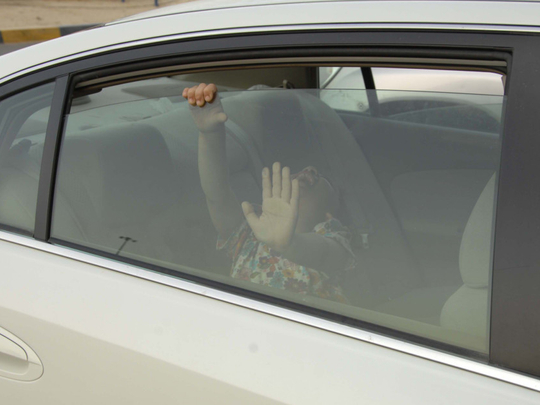
Dubai
As temperatures inch toward 40 degree Celsius in the UAE, experts are warning parents to refrain from leaving their children in a locked car — even for a few minutes — while running errands.
It can take as little as 10 minutes for a car’s interior temperatures to rise by 80 per cent in summer heat, enveloping a child with fatal temperatures that can lead to overheating for the child three to five times faster than an adult.
A tragic string of child deaths across the UAE in recent years, including the death of a four-year-old Emirati child left in a garage in Sharjah in July of last year, lends urgency to calls by experts for child safety in the UAE.
In 2015 177 children were left in cars in the space of 16 months, a Dubai Police official said, noting that children left behind in cars parked in shopping malls and public parks were rescued before succumbing to heatstroke.
“We saved 137 children who were kept in parked vehicles last year and another 40 in the first quarter of 2015,” Major Abdullah Ali Mohammad, Director of Land Rescue at the General Department of Transport and Rescue had stated at the time. “Luckily, officers from the department found these children moments before they risked suffocating.”
Dubai-based clinical psychologist Mary John told Gulf News on Sunday that the “psychology of forgetfulness” can play a large role in momentary lapses parents have when they leave their children behind.
“This is something all mothers and fathers need to be warned about,” John said, noting that parents’ brains are “constantly firing, hormones are racing … this is the time that you forget things. Rationality to react to a situation is eroded and people just suddenly forget.”
John said mothers can fight forgetfulness through clearer thinking and better organisation achieved by creating daily mental to-do lists and rehearsing them the night and morning before as well as putting their children’s safety before anything else in their lives.
“Do not give priority to anything more than your children,” John said, adding that prioritising the child as number one helps rewire the brain which can impact all other decisions.
Janette E. Fennell, founder and president of KidsAndCars.org, one of the leading global advocacy groups trying to prevent hot-car deaths, had said in a prior interview with Gulf News that child deaths happen “with either a change in routine or a momentary lapse of memory where the adult ‘thinks’ the child has been dropped off at day care or removed from the vehicle. Everyone thinks someone else has removed the child. This appears to be the situation where the grandmother ‘thinks’ the child is with her siblings,” Fennel said.
By comparison, in the United States, statistics compiled by KidsAndCars.org reveal that 724 children have died from vehicular heat stroke from 1991 to 2014 across the country.
Box
The dangers
The inside of a vehicle heats up VERY quickly! Even with the windows slightly down, the temperature inside a car can reach 125 degrees Celsius within minutes.
Keeping windows down slightly does not help slow the heating process OR decrease the maximum temperature
80% of the increase in temperature happens in the first 10 minutes
Children have died from heatstroke in cars in temperatures as low as 15.6 degrees Celsius
A child’s body overheats 3-5 times faster than an adult body.
Change in normal daily routine, lack of sleep, stress, fatigue, distractions, hormone changes, worry … symptoms that ALL new parents experience!
Rear-facing car seats look the same whether there is a baby in it or not.
Children, especially babies, often fall asleep in their rear-facing child safety seats; becoming quiet, unobtrusive little passengers.
SOURCE: KidsAndCars.org










